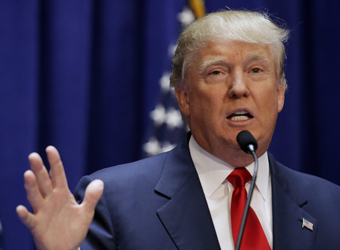When it comes to fighting ISIS, Donald Trump may need to keep his friends close and his frenemies even closer.
President-elect Trump’s anti-Muslim rhetoric and aggressive language around the Middle East resonated with Americans during the election and is seen by pollsters as one factor that contributed to his victory.
Trump also got cheers when he said he would “get tough” with Pakistan, a country that has given birth to many terrorists and has been criticized for being less than wholeheartedly supportive when it comes to finding extremists within its borders — Pakistan is, after all, the country U.S. special forces infiltrated in the dead of night to kill Osama bin Laden.
But former prime minister of Pakistan Shaukat Aziz, who led the Muslim-majority country from 2004 to 2007, told CNBC this week that “we all have to work together” if terror cult ISIS is going to be defeated.
“It is not the problem for one country. Countries have to learn to work together,” said Aziz. “ISIS has to be handled regionally and locally. ISIS is a threat to the world, and everyone has to contribute.”
For the United States, that includes working closely with Russia and China, said Aziz, whose country, analysts point out, is trying to cultivate closer ties with both.
“It does appear that Pakistan is heading toward an alignment with China and Russia both economically and militarily. This does pose challenges for the United States to the effect that it has lost considerable leverage with Pakistan,” said Bharath Gopalaswamy, director of the South Asia Center at Washington-based think tank the Atlantic Council.
Aziz also said the United Nations should play a more active role in combating terrorism. “The U.N. has been missing in action. They need to be brought in to the forefront as the blue helmet and as an enabler of peace.”
Since being elected president, Trump has shifted his tone on Pakistan — he took a call from current Prime Minister Nawaz Sharif and called Sharif a “terrific guy.” However, Pakistan watchers still see relations with the U.S. strained over the next four years.
“Despite effusive praise for Pakistan and Prime Minister Nawaz Sharif during their initial call, Trump’s suspicion of immigration from terrorism-prone Muslim countries, public admiration for India, harsh rhetoric toward China (Pakistan’s ‘all-weather’ friend) and hawkish political appointments suggest that U.S. relations with Pakistan will suffer over the next four years,” said Sasha Riser-Kositsky, South Asia analyst at research and consulting firm Eurasia Group.
The Pew Research Center estimates that there were about 3.3 million Muslims of all ages living in the United States in 2015. Muslim-Americans are not taking Trump’s rhetoric lightly, and some point out that the president-elect could be hurting the U.S. image among the moderate Muslim majority globally.
“Muslim-Americans are dismayed, upset and afraid about a possible Muslim ban, but many are ready to fight in court should a ban be realized,” attorney Ahmed Soliman, who is president of Soliman & Associates, told CNBC via email. “The effect on Muslims overseas is worse, however, and worries me most. This call for a ban only perpetuates false narratives about the United States hatred of Muslims and doesn’t do anything to win over the hearts and minds of Muslims overseas.”
“Trump will indeed push more Muslims into the hands of ISIS,” Soliman said.
Trump’s unpredictable nature means it’s too early to say unequivocally whether he will follow through on a Muslim ban. Aziz dismissed the idea as “political talk.”
With around 200 million people and a growing middle class, Pakistan has some of the most important traits of a hot, emerging market. However, the threat of terrorism hampers the country.
In late October, S&P wrote to clients that the credit ratings agency may raise its ratings on Pakistan if the country’s security environment settles to an extent that economic growth trends higher.
Source: CNBC
